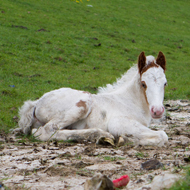
Charity raises concerns about 'invisible' horses
A new study by the charity World Horse Welfare suggests that as many as 15,000 foals a year could be 'slipping through the net', as their owners fail to ensure they have a microchip and passport.
As a result, these horses cannot be linked to an owner and are effectively 'invisible', putting them at greater risk of welfare problems.
World Horse Welfare's chief executive Roly Owers says horses that are chipped and passported are likely to be better off as their owners are taking responsibility for them.
"It's the foals that are not identified who are a greater concern to us," he explained. "They are invisible to the system, and cannot be linked to anyone responsible for their care. In addition no vet can administer a medicinal product to a horse or pony unless it has a passport so this adds to the problems that these animals may face if they become ill."
The charity contacted 66 of the UK's equine passport issuing organisations. Using data from the 38 organisations who responded, together with estimates from those that did not, the charity concludes that around 25,000 foals were born and recorded in 2014.
But based on the total equine population, the charity believes the real figure is likely to be as high as 40,000, which leaves 15,000 horses unaccounted for.
"This may be a crude estimation," added Mr Owers, "but it is based on evidence from both World Horse Welfare and a number of other charities and organisations.
"This failure to apply for a passport in time is not only contrary to current EU regulations but it puts these animals at a much higher risk because they are effectively invisible and not on anyone’s radar."
Legally, owners are required to microchip and passport their horse before it reaches six months of age, or by 31 December in the year of the animal's birth. Owing to widespread problems with the passport system, however, it is held in contempt by many owners, the charity says.
The latest figures from World Horse Welfare suggest there are more than 4,000 'at risk' horses in the UK, with thousands more in the care of charities with limited capacity and stretched resources.
World Horse Welfare itself took in more than 100 horses in just 40 days before Christmas - using up nearly a third of its total capacity.
The charity has begun a year-long campaign to shine a light on 'invisible' horses - including foals and working horses globally. Other campaign themes will include rescue and rehoming and legislation.
Image courtesy of World Horse Welfare



 RCVS Knowledge has called on vet practices to audit their post-operative neutering outcomes.
RCVS Knowledge has called on vet practices to audit their post-operative neutering outcomes.